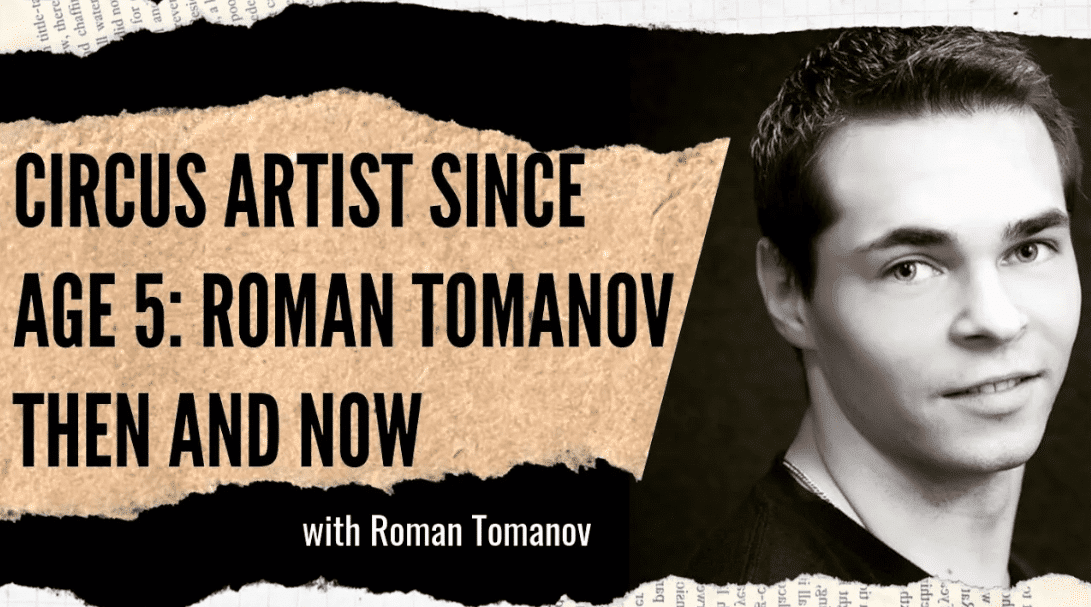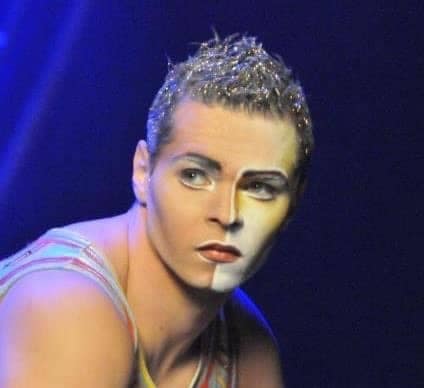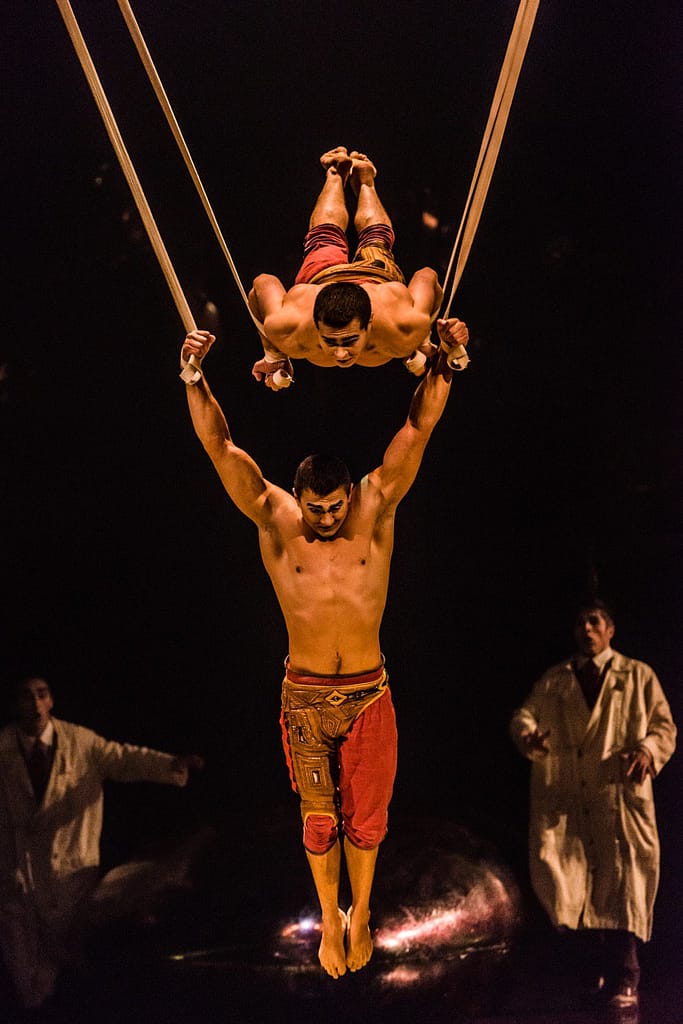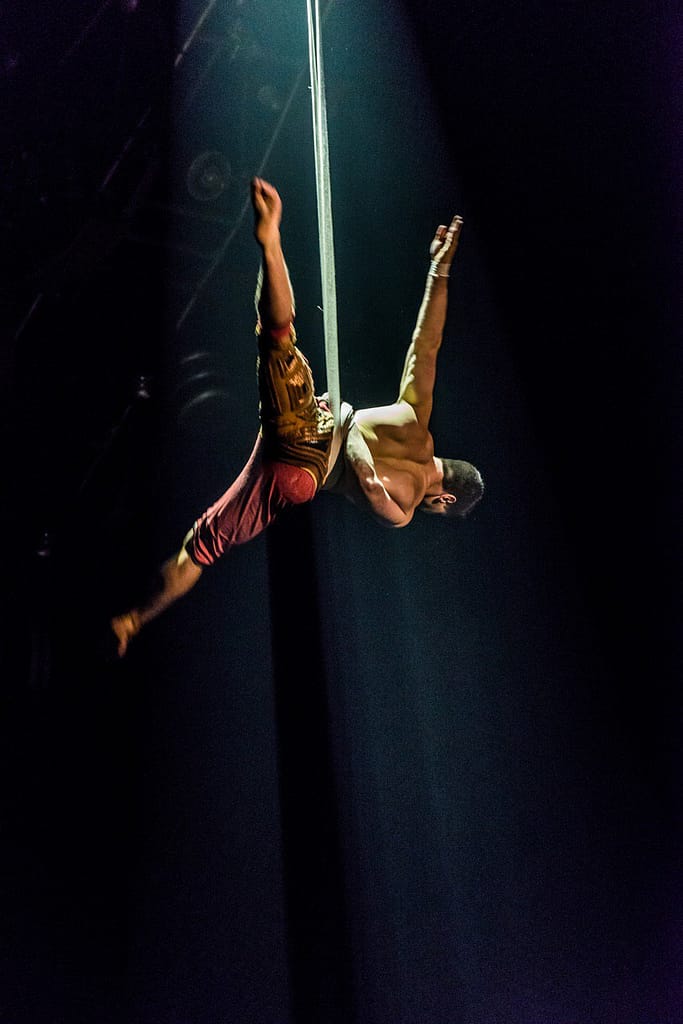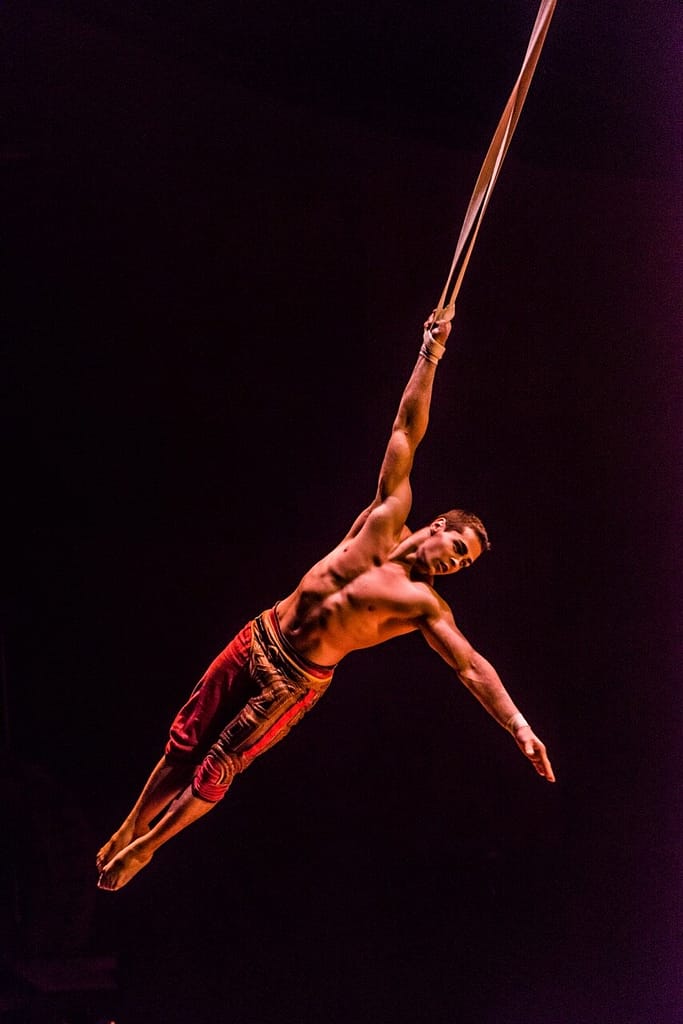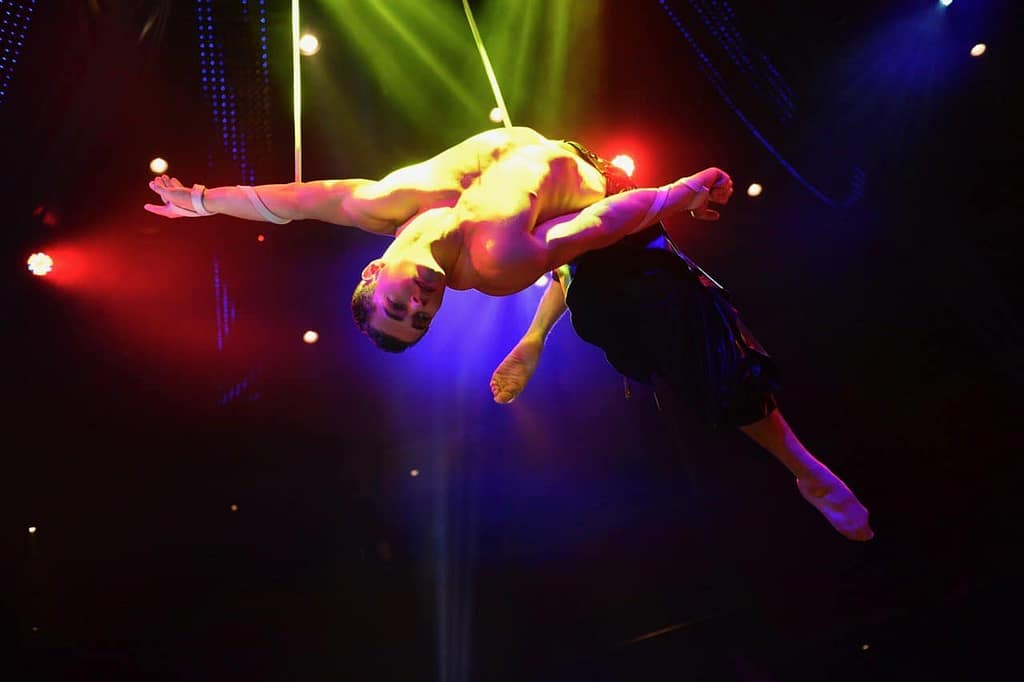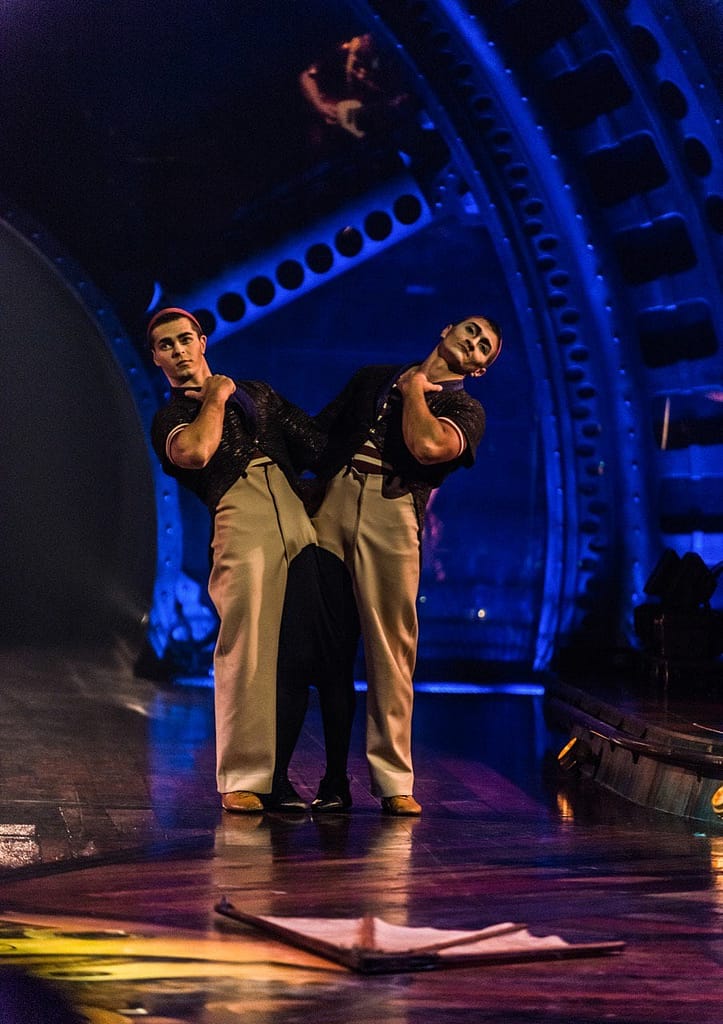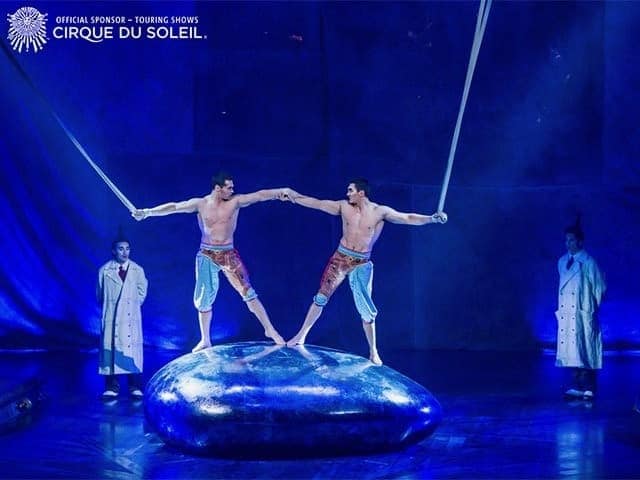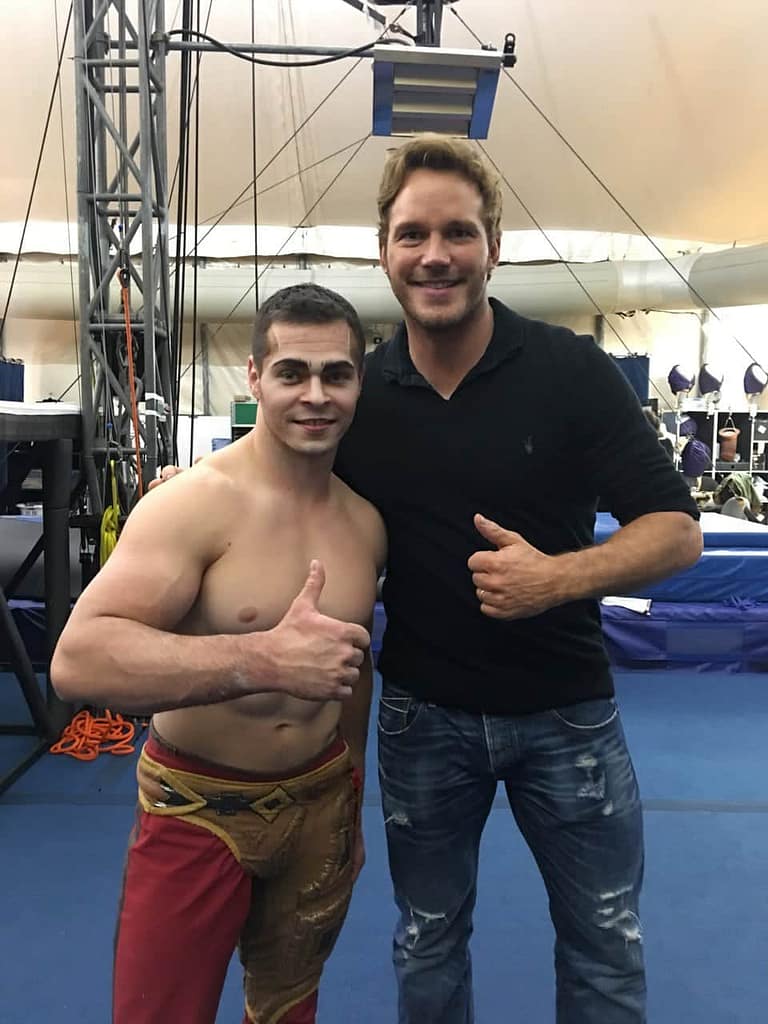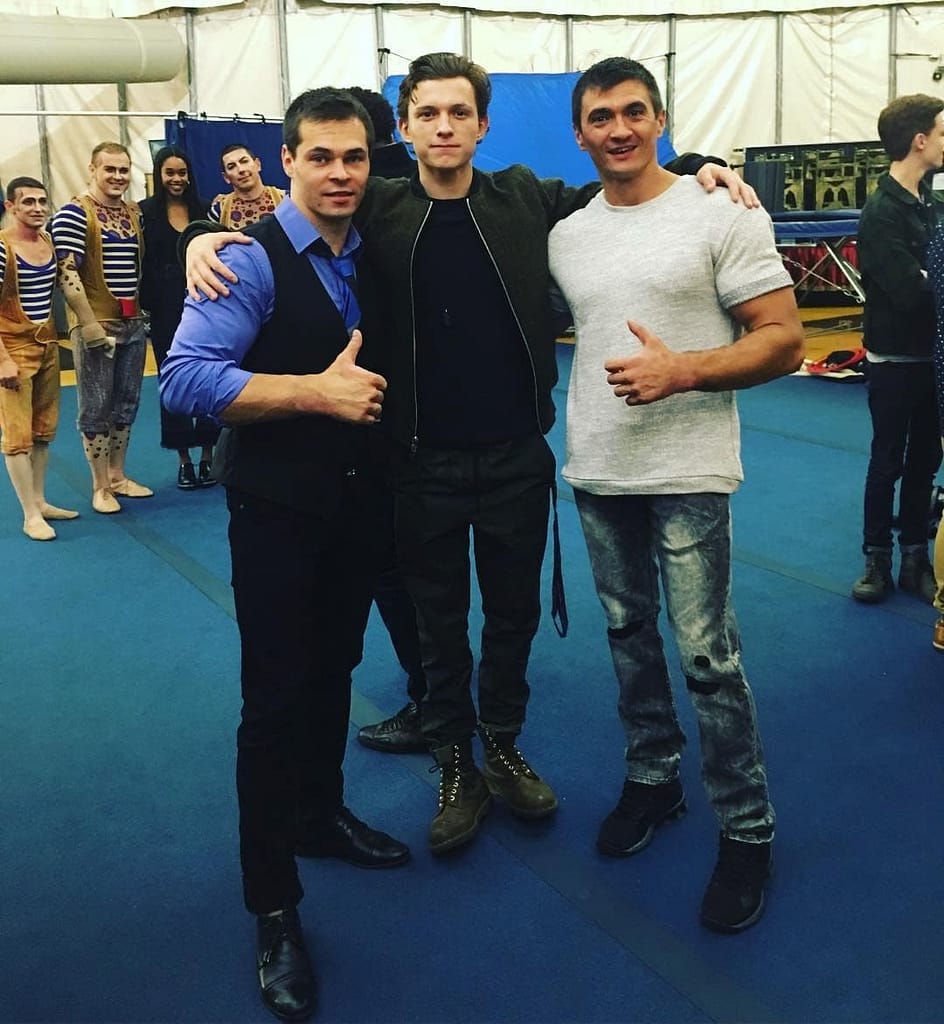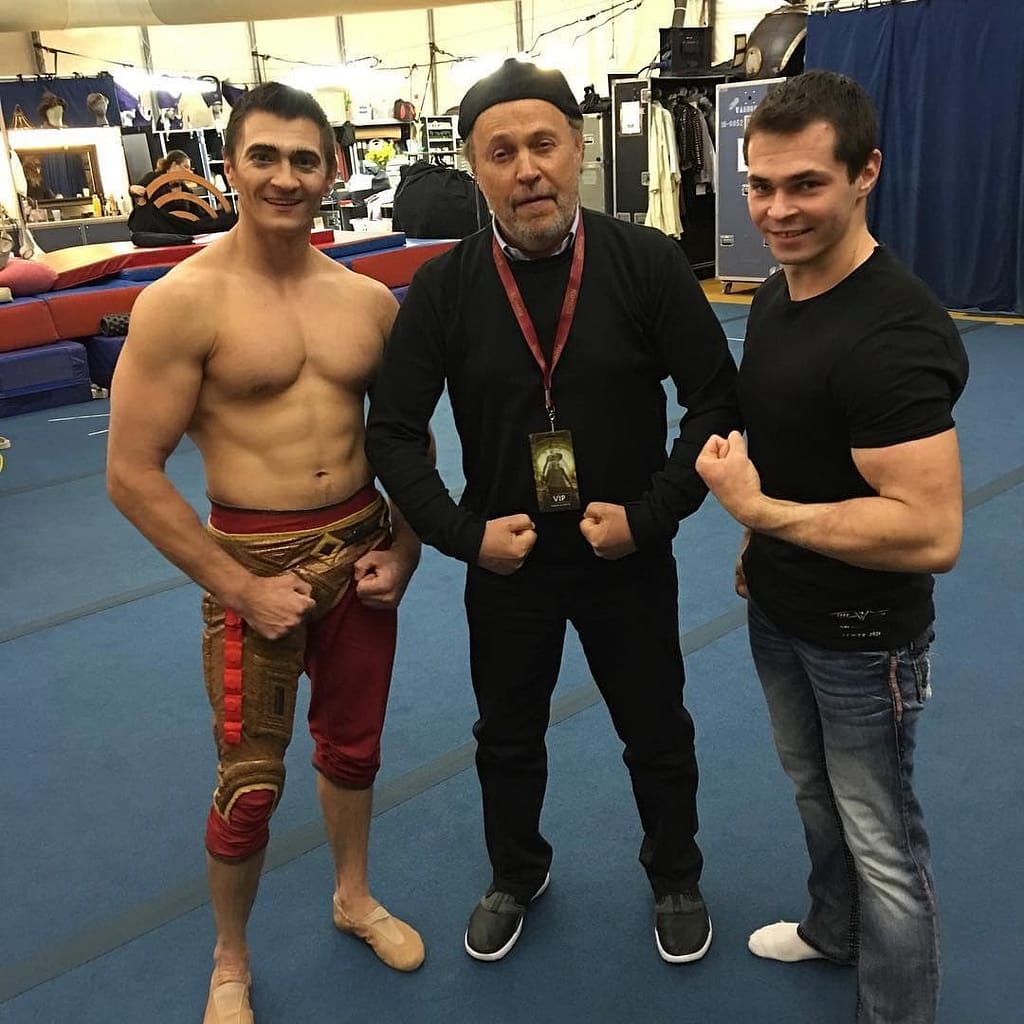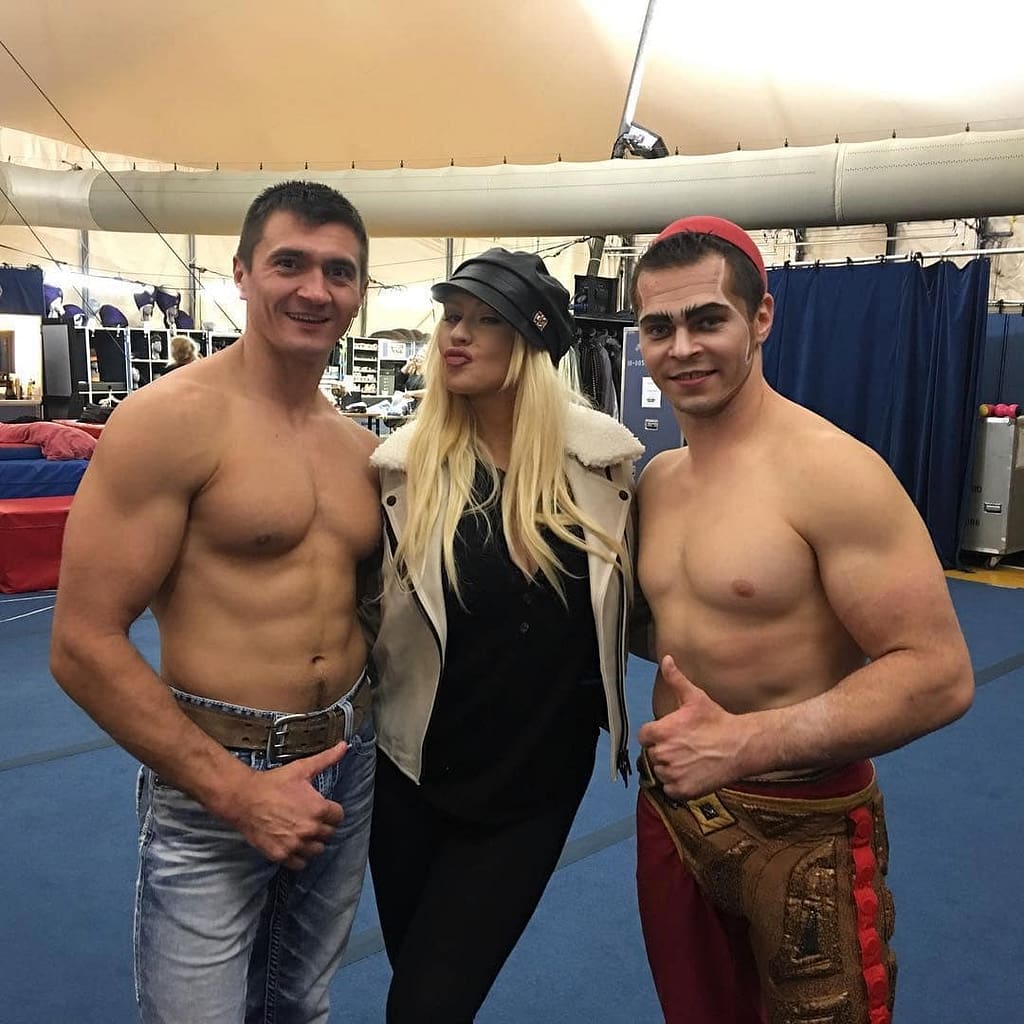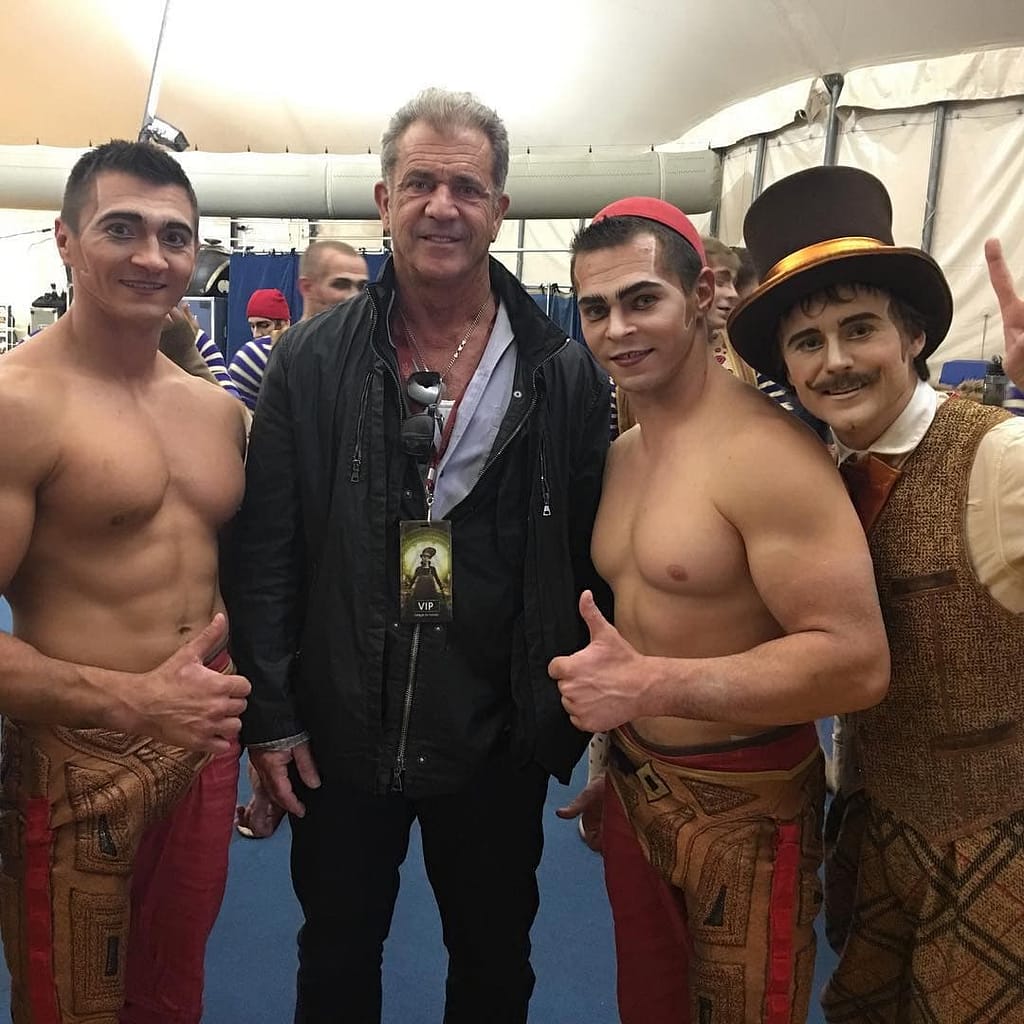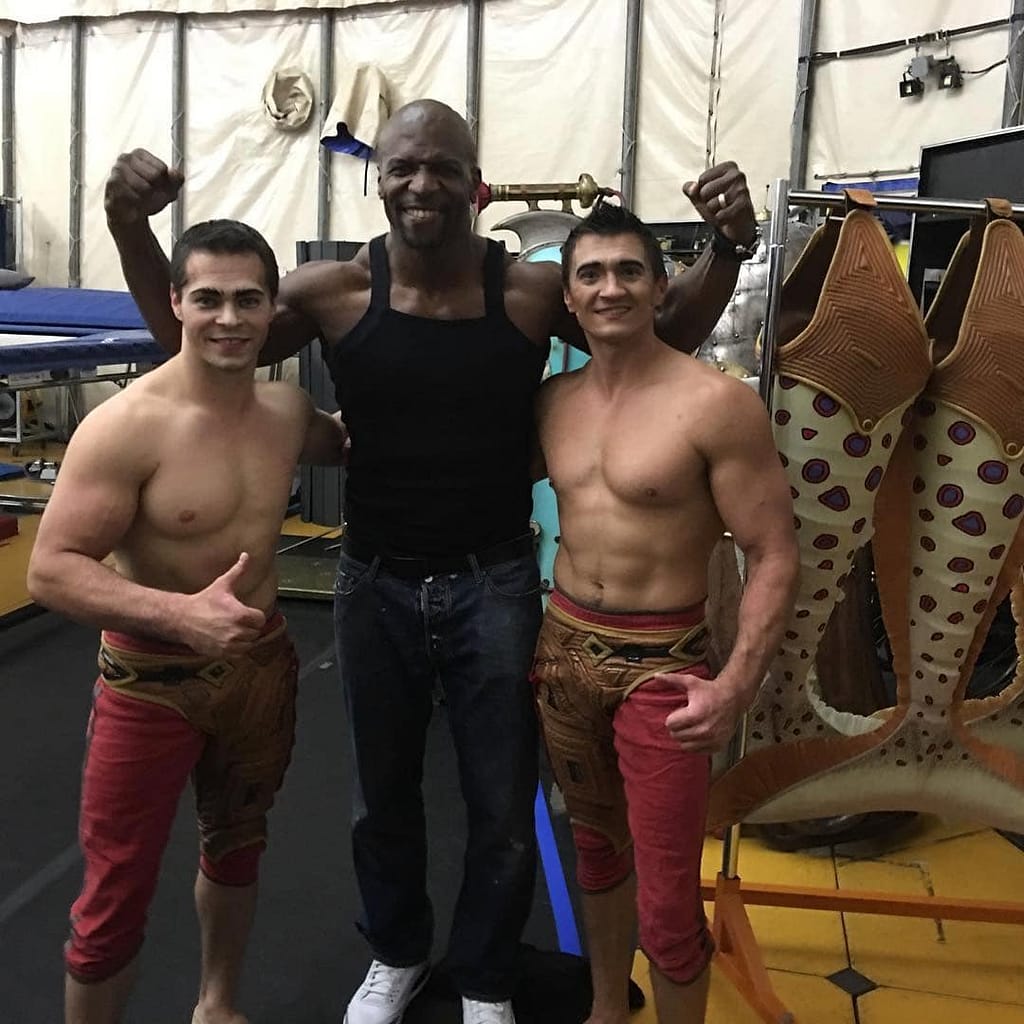Roman Tomanov: Born With a Set of Straps – Then and Now. (#106)
Our Guest Today: Roman Tomanov
Roman Tomanov (@romantomanov) was born in Moscow, Russia inside a circus family. His father was his coach. He began public performances at the age of 5.
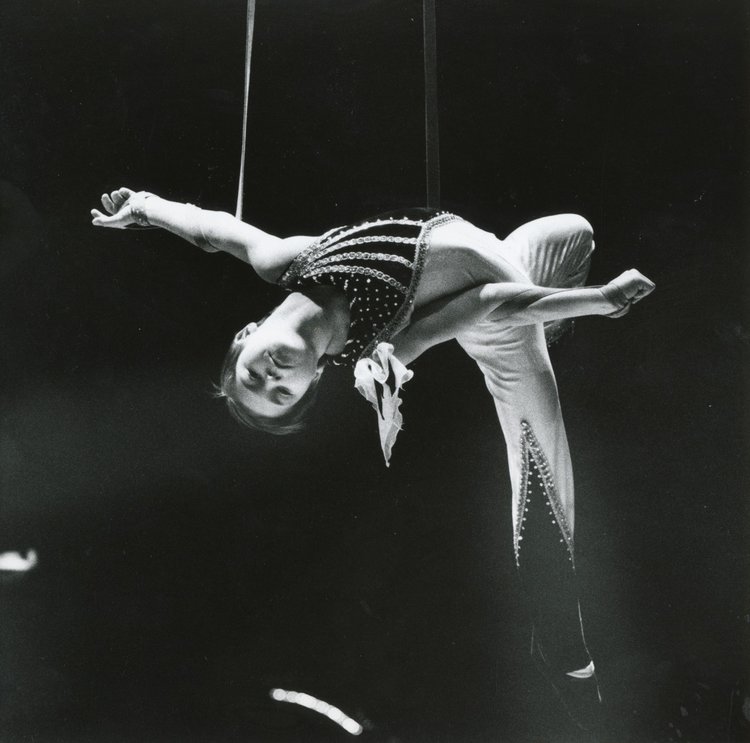
After immigrating to the US (and residing in Las Vegas at a young age), Roman has performed with the largest theatrical production company in the world, Cirque du Soleil. His most recent appearance is with KURIOS the Cabinet of Curiosities.
If you can’t see the player above, listen and download the audio here.
In addition to aerial acts, Roman is a trained performer in bungee, trampowall, flying harness, break dance and movie stunts.
What’s interesting about this conversation is that Roman and I didn’t intend it to be a podcast episode. Therefore you’ll find the style a bit different than previous episodes, my questions are shorter, so are Roman’s answers in many cases. Rapid fire Q&A style.
Roman Tomanov in Action
Roman’s Circus Career in a Nutshell
At the age of 9, Roman won his first prestigious “Silver Clown Award” at the Festival International du Cirque de Monte-Carlo, which was created in 1974 by H.S.H. the Prince Rainier III of Monaco to promote circus arts.
In the following years, Roman continued to win international competitions including a Bronze Metal at the Wuhan International Acrobatic Art Festival, a Bronze Trophy at the 5th International Circus Festival in Rome Italy, and a Silver Metal at the Festival of Mondial de Demain in Paris France.
Recognized with the Bronze Metal at the 5th International Circus Festival in Budapest Hungary, Roman competed against the most prominent performers of the Circus Arts in the world. In the same year, Roman took Gold Medal at the European Youth Circus Competition in Weisbaden Germany. Next to the circus festivals in Paris and Monte Carlo, the European Youth Circus is the most prestigious event of its kind in Europe.
To learn more about Roman, visit his website https://www.romantomanov.com/
Roman with his fans
Show Notes
- [04:00] The origin stories of where it all began
- [04:30] Training in Korea
- [05:00] Your father, your coach.
- [05:30] Roman’s 9-year old twin sisters and performance in America’s Got Talent
- [06:00] Training to become a professional
- [07:00] Working with brother Vitali Tomanov in KUIROS (Cirque du Soleil)
- [08:00] Growing up in Las Vegas
- [08:30] Meeting parents and siblings for the first time at age 5
- [09:00] First performance on stage
- [10:00] Circus straps acts
- [11:00] Changing the types of straps as Roman gets older
- [13:00] Stage fright. No way.
- [14:00] Story behind KURIOS
- [18:00] Watching other circus shows as a performer
- [21:00] 4 years in Macau, China
- [23:00] Zaia
- [23:30] A Day in the Life of a Circus Actor
- [24:30] Alternative career path?
- [25:30] Roman on music production (one of his interests)
- [26:00] Managing and recovering from injuries
Other Posts You’ll Love
- Shana Carroll: Director of Crystal – the First Show on Ice from Cirque du Soleil
- Eirini Tornesaki: Risks and rewards inside and outside of KURIOS – Cabinet of Curiosities
- CRYSTAL | Cirque du Soleil – Interview with Senior Publicist Christine Achampong
- The Atherton Family: Celebrate Art and Family Life (#139)
Transcript
Roman Tomanov Born with a Set of Straps – Then and Now..m4a: Audio automatically transcribed by Sonix
Roman Tomanov Born with a Set of Straps – Then and Now..m4a: this m4a audio file was automatically transcribed by Sonix with the best speech-to-text algorithms. This transcript may contain errors.
Fei Wu:
Welcome to the Phase World Podcast. Engaging conversations that cross the boundaries between business, art and the digital world.
Fei Wu:
Hey, ladies and gentlemen, boys and girls, welcome to another week of the Feisworld podcast. I am your host. Fei Wu Feisworld is a homegrown podcast production company. We love unsung heroes and self-made artists. Unlike celebrity focused podcasts, we want to focus on people like yourself who are willing to share the most authentic stories out there. Not just the successes, but also the failures, the heartaches along the way. Today, I am joined by Cirque du Soleil artist Roman Tomjanovich, who was born in Moscow, Russia, into a circus family. His father was his coach. He began public performances at the age of five after immigrating to the United States and residing in Las Vegas at a young age. Ramon has performed with the largest theatrical production company in the world, Cirque du Soleil. His most recent appearance is with Cheerios, the Cabinet of Curiosities, in addition to aerial acts. Roman is a trained performer, also in bungee tramp, a wall flying harness, break, dance and movie stunts. Prior to curios by Cirque du Soleil, Roman had the pleasure to perform with Lenoir, and before that he was with Zawya by Cirque du Soleil, located in Macao, China, between the years of 2008 and 2013. What's interesting about this conversation is that Roman and I did not intend it to be a podcast episode. Therefore, you will find the style a little bit different than previous episodes of the podcast. My questions are shorter, so our Roman's answers in many cases.
Fei Wu:
We dive deep into Roman's origin stories, his early training, and how his dad, Slash's coach, turned their home into a gym at the age of nine. Roman won his first prestigious Silver Clown Award at the Festival International du Cirque at Monte Carlo. In the following years, Roman continued to win international competitions, including a bronze medal at the Wuhan International Acrobatic Art Festival, a bronze trophy at the Fifth International Circus Festival in Rome. Italy recognized with the bronze medal at the Fifth International Circus Festival in Budapest, Hungary, Roman competed against the most prominent performers of the circus arts in the world. In the same year, Roman took gold medal at the European Youth Circus competition in Germany, next to the Circus Festival in Paris and Monte Carlo. The European Youth Circus is the most prestigious event of its kind in Europe. You can visit Feisworld dot com for show notes and favorite quotes related to this episode. And as always, if you could share Feisworld Podcast with one more front, just one more person, we would greatly appreciate your support. Without further ado, please welcome Roman Tomjanovich to the Feisworld Podcast. Let's talk about when you were five, six and seven, because I saw some of the photos where some of the photos were taken at home. And I think you may I don't know what type of house that you grew up in, but there were straps and there's like silk straps all around.
Roman Tomanov:
Yeah, well, I started training in Korea, so, yeah, it was my dad. My parents were working in a show in Korea. It was some kind of, like an inside theme park and. Yeah, and that's where I started training. I actually had a mattress that I was sleeping on that was my mat for spotting, and that was my sleeping mattress as well. So I used my mattress for both as like a safety mat and yeah, so it was pretty intense.
Fei Wu:
Wow. In Korea. So do you speak a little bit of Korean or. No?
Roman Tomanov:
Oh, no, no, no. I was like, I was five, five, six years old at that time. So, yeah, that's kind of where he started stretching me and everything. That's where I first started doing Learning Straps.
Fei Wu:
Who was teaching you?
Roman Tomanov:
My dad. My dad was teaching me in the beginning.
Fei Wu:
Wow. So both of your parents are performers?
Roman Tomanov:
Just my dad. My dad went to circus school in Russia, so my dad did a lot. He did like theater board. And because he worked in an oval with another Cirque du Soleil show. And. Yeah, he did. Flying trapeze. Yeah, my dad did a lot.
Fei Wu:
Oh, Whoa. I remember. It's the the original Cirque show. And I remember when I was in Vegas and they were completely sold out.
Roman Tomanov:
Although it was a touring show overall, was it was a touring show and it was based on insects. Yeah. So that's the one that my dad was In no way.
Fei Wu:
What type of act is he training for?
Roman Tomanov:
Well, he's training my two twin sisters, teaching them straps as well.
Fei Wu:
And I heard that they're super young.
Roman Tomanov:
Yeah, they're nine years old. They're already pretty crazy.
Fei Wu:
Wow. All right. Okay. This is super fascinating. Oh, we'll come back to you. What was the conversation like when your dad approached you when you were five years old and say, you know, let's do this, like professionally or.
Roman Tomanov:
Oh, I don't think there was ever a discussion like that. I think we just started training. He started training me like stretching me four splits, like basic acrobatics and stuff like that. And I don't know, apparently, I guess one day he decided to try straps. Apparently he just got some straps. And it was funny because I was training at home so there was no place to put up the straps. So apparently there was a there was a ceiling and there was like a little gap on top of the ceiling. So he built a little rig to put the straps on there. Yeah. And I guess I was I was light enough though. So. Yeah, it's it's an interesting story.
Fei Wu:
Wow.
Roman Tomanov:
Yeah, that's how I started.
Fei Wu:
And you have an older brother toos who was performing with you in serials. And that's how kind of how we met. Where was he at the time? Where you guys training together when you were five? You know, he's a little bit older.
Roman Tomanov:
Well, yeah. What happened was, when I was born, I was born in Moscow. My dad already signed. I had a signed contract in Vegas. I believe there was a show called Effects, so they couldn't take all of us. So they only could take like one of us. And I was just born. And so they had this contract signed and they had to fly to Vegas to start the contract. And I was left with my mom's parents and I moved to Ukraine and I lived with my mom's parents until I was like four and a half, five. And my brother stayed in Moscow with my dad's parents and my sister went with my dad. So she was training already with my dad.
Fei Wu:
And this is your older sister?
Roman Tomanov:
Yeah. So we all kind of split in that first for like four years. So because they couldn't afford to bring all of us because it was just too expensive at that time.
Fei Wu:
Yeah.
Roman Tomanov:
And then I think an age of five, I flew with my parents, my mom's parents to Moscow, and we stayed there for a little bit, picked up my brother. That's where I met my brother for the first time. I didn't even know I had a brother. Yeah, it was pretty.
Fei Wu:
So you moved to Vegas when you were five? Around?
Roman Tomanov:
Yeah. Yeah.
Fei Wu:
And then you were in Korea. I mean, wow, you're a world traveler.
Roman Tomanov:
After that, we went to Korea. My. My dad had a contract in Korea, and then after we finished Korea, they went. We all went back to Vegas.
Fei Wu:
I can't believe I learned so much about you in 10 minutes. Wow. Are you thinking that you're the only child before you met your brother and sister?
Roman Tomanov:
I didn't really know. I didn't know because even when I came to when I flew to Vegas, I didn't know that they were my parents because I never met my mom or dad until I flew to Vegas. I was five years old at that time.
Fei Wu:
Wow.
Roman Tomanov:
I lived with my mom's parents the whole time.
Fei Wu:
Yeah. So tell me a bit more about your first stage experience. If you still recall. Like, do you remember when you're seven?
Roman Tomanov:
One of my first performances was in it was in Studio 54. There used to be my dad was working in a big, big show before I was called Fox. And that show, I can't remember for how many years it ran for, but it was like one of the biggest shows at that time in in the world, I believe, because they had some pretty crazy stuff. They had like this huge dragon on stage and my dad was working in the flying trapeze act there.
Fei Wu:
Mm hmm. I grew up in China, and sort of general circus acts are something that very much ingrained, even though we were most of us obviously weren't trained for for it. It's like like, you know, not all Chinese people know kung fu, but there were. We went to a lot of shows and then every year during Chinese New Year, I mean, trapeze, it's kind of like 50% of our national show. So every 1.2 billion people are kind of zooming in and watching that. But what are some of the different types of flying? Is it fly? Flying. Trapeze. I noticed in your acts they're silk based and there's more. All these like bands, elastic bands. What's the difference between them?
Roman Tomanov:
I'm not really sure, but I believe Straps came. It was a Chinese invention because there used to be they used to do group numbers. They used to be like five or six people performing on a single pair of straps. But I believe that this act came from China.
Fei Wu:
And I've done I've seen you in curios, for example, are these kind of pretty harsh looking bands. And I know that you have a lot of calluses on your hands as a result of it and your arms possibly. And then there when you're younger, I notice there's more silk, almost like wings, and then you kind of gather them all and they start to look more like regular straps. What's the difference for you? I mean, is there such a thing as when you are younger, you have to start with a different set of straps or when you're older?
Roman Tomanov:
The thing is, I was using full cotton straps, but they are very dangerous because they don't hold as much weight. So the older you get, you become heavier and it becomes more dangerous using that kind of straps. At that time when I was training, they didn't really have anything else to use. So that's what I believe, what everybody was using for cotton straps. And it wasn't until like I was 13 or 14 years old, we found a guy that was building straps and actually he's now building straps for Cirque du Soleil. I was one of the first first ones to build from him. And then Cirque kind of started using them.
Fei Wu:
Wow. So that's I'm just trying to do the math. That's about 15 years ago. It's interesting that how the innovation happens within Cirque, because it feels to me that it's very natural for circus in general to kind of go through the transition.
Roman Tomanov:
The thing is, when when I came in, I also auditioned. I did Soul Strome for Cirque du Soleil. It's a it was a series. It was like a Cirque du Soleil series. They had they would invite specialty acts and they would record them and they would they would show it on live television. So, yeah. And when I came in, they looked at my straps and they were like, Oh, wow, these are super. They're dangerous because they're fully cotton and they're known to rip at a certain breaking point. But I was so young, so I wasn't wearing that much, so it was still okay. But yeah, they let me use them. But after that, me and my dad were looking for a company that could build good quality straps with low power.
Fei Wu:
So I can't believe that it was you and your dad who had a look for better quality straps.
Roman Tomanov:
So it did have straps at that time, but I was still young and there were too big. There are way too big for my hands. I couldn't really use them even now. I still don't like the ones they use. And we had to find and we found a guy in Vegas, actually, he was building a saddles. He was built like saddles and few rigging things. And then, yeah, so I came to him, we spoke, spoke to him about it, and then he built me the first straps.
Fei Wu:
That actually fit. It's almost like to me it was like custom suits, you know, like everything is measured based on your weight, on the size of your hands. And when did you feel like you were growing up? You started doing this when you were seven. And I know performing arts is very different as you progress through different ages. And when did you feel nervous or when did it actually hit you to realize that when you're old enough, just like, Wow, I'm on stage performing in front of hundreds and thousands of people?
Roman Tomanov:
I think that was never an issue for me. I only got nervous when I did competitions like circus festivals, circus competitions. So I think that's when I would get nervous because you would have to perform. It doesn't really change much. You're still performing for the same people, but it's just that thing that it's a competition. If you mess up or something, they they really pay attention to that kind of stuff like your lines or everything. They pay attention to it. And I think that was the only moments where I really got nervous. I go out there and do my thing.
Fei Wu:
Do you think it? Going from when you were like a solo performer when you were younger, to kind of performing together with your brother. How was that transition? Did that change?
Roman Tomanov:
Well, this is the first show that me and my brother were actually together in an Act one act together. But we've worked before in a show together, but separate acts. It was actually a really interesting story because the original act was supposed to be the Atherton Twins for curious.
Fei Wu:
I heard they told me I was like, Oh, Small world.
Roman Tomanov:
Yeah. So they were the original cast picked. I remember calling Cirque and I asked them, like, You guys have anything lined up for stripes? They're like, No. And ask them for this new project that's coming up. They're like, We already have the Atherton twins already signed. I was like, Okay, so just keep in mind, if anything comes up, let me know. And one day we're just me and my brother. We're in the gym. Not really sure what we're doing. And I did some kind of a move and he's like, Oh, let me try that too. So he copies me and then I was like, Let's do that together. I was like, Okay, cool, let's do this now. Synchronize it. So we're like, perfectly on time. Then I was like, Oh, wow. And then we asked my brother's wife to video it, and we're like, Oh, wow, this looks really interesting. Let's let's come up with more stuff. So I believe in like a week we had some kind of material already and they're like, We're just sitting there like, Let's just send it to Cirque and see what they think. Okay? So we sent it to Cirque and I believe like two or three days later, they contact us about Curious. They're like, Are you guys interested in working together? And we're like, Wow, that was quick.
Fei Wu:
Isn't it amazing?
Roman Tomanov:
Yeah, it was pretty awesome.
Fei Wu:
That's amazing because I think Curious started maybe a couple of years ago. And the back story of that is, I'm so glad you sent the video. One of the twin brothers, Andy Atherton son, was born at that time, and I think it's crazy. When I interviewed them, they said they missed literally two shows. And because he had two kids. Precisely two kids. And he had to miss those two days. And I guess the brother couldn't perform on his own. And it's interesting how sort of the universe and and all of these things just sync up.
Roman Tomanov:
We had really had no idea. We kind of we didn't really plan for anything. We just kind of like said, okay, let's just send it in and see what they think. And then a few days later, they were like, Wow, that's awesome.
Fei Wu:
I'm very glad to hear that because I've seen so many shows. And Curious is so far absolutely one of my favorites. And I when I say I mean two, two shows I enjoy the most is curios, and the other is Paramore.
Roman Tomanov:
I watched it like three times when I was in New York. And it was funny because when we were there we had like a week before we started with Curious and me and my friend were walking in the center of the city and, and we were just walking there and I was like, Let's go check out the theater where the theater is at. Okay. So we get there. We're like, Oh, what time is the show? It's like, Oh, it's in one hour. We're like, Let's just ask them if we can go in. So we went and spoke to the ticket booth because we told them we're like from Cirque du Soleil as well. We're here for curious. And he's like, You know what? I can't give you any tickets, but come back in 30 minutes and maybe I can hook you up and yeah, And then we came back in 30 minutes. They're like, Go get it and get in and get in. Whoa. Because usually, like, you have to call in advance and book everything. And they're like, Get in, get in, get in. Yeah. So, so we, we got to watch it three times. Really great show. I really liked it.
Fei Wu:
It's awesome. I think you were really like the Atherton twins. They're just the most like they're super down to earth and like.
Roman Tomanov:
Oh, they're great. They're great people, for sure.
Fei Wu:
Yeah. Have you met.
Roman Tomanov:
Them? Yeah. Yeah, because they used to come to train and, well, actually, his wife Gusta was training Oracle and Vegas, and that's where I trained. So I saw them quite often. Oh, wow. So yeah, that's when they were working in Zarqa, I believe.
Fei Wu:
Oh, yeah. Yeah, exactly. That's the one I went to Vegas to see.
Roman Tomanov:
Yeah. Yeah.
Fei Wu:
So what was it like for an artist like yourself to watch another Cirque show? What did it feel like?
Roman Tomanov:
I don't know. It's hard to explain because I grew up like, basically in the circus world. So for me, I always watched acts and like different circuses. I liked. I loved it. It's always nice to watch other people perform. It's great to be a spectator as well.
Fei Wu:
Finally. So let me tell you how you can improve this. What I really enjoyed about the Orioles, I think the reason why so many people love the show is because it's it felt smaller and way more intimate. I love how close I could get to the stage. And I don't like to be really far away. I don't like the feeling of being like this huge stadium. And I'm over here and the act is over there. And Kyrgios, I think it's also kind of fascinating is it's so mysterious. There's something there's like a story behind a story and and behind a story and you can really take your imagination. It's it's non-obvious, you know?
Roman Tomanov:
No, it's definitely a great show.
Fei Wu:
Yeah, it's very cool. I when I talked to Rainey, she told me that she was she was crying the entire time, watching the show, kind of seeing it from the audience. So we're going to go travel back a little bit. I, I love the costume. I could talk about curios forever, which I'm not going to because we have 20 years of your experience. 22 So what was the show before curios that you were involved in?
Roman Tomanov:
Well, I did Lenoir It was a small show. It's a small company. It's actually based off base entertainment. It's a big group in Vegas. And yeah, we built this show like 2 to 3 weeks. There was a director that came in and we put put the show together and we worked for three, three months, four months, three, I think three and a half months or three months in Japan. So we did Tokyo for three months with Lenore, and before that I did absinthe in Las Vegas. It's actually a great it's a really funny show in Vegas. It's definitely a must see if you ever go to Vegas. So I was there. They took me for a month and I ended up working there for like four or five months. And before that I did with Cirque du Soleil, but I was part of a house troupe, so I did jumping off. So I didn't do straps, but it was still really cool to do something different. Like you get to jump off of like bungees and stuff like that. But I was there for a short, short period, like three months as well. And yeah, and before that I was working in Zaia in China and Macau for four years, four and a half years.
Fei Wu:
No way. Wait a minute. Zaya. Zaya was in Macau, which I didn't know that. And people in Macau are crazy. And the travelers, the Macau are they're just crazy about other shows. In fact, I'm going to sort of whisper that because my friend Pam, who's from Macau, you know, said that the shows in Macau are better than the ones in the US. I I'm going to quote her. So what was it like living in Macau for four years?
Roman Tomanov:
It was great because I that was my first experience by without having a bodyguard or without working with my daughter. So it was kind of it was a great experience for me. I made a lot of friends and actually it was fun. It was very different because I wasn't used to like doing things by myself, but I loved it. I actually I loved it. You know, it's like you're let little in this world and you just go do your thing. So, yeah, it was it was hard, but it was it was fun.
Fei Wu:
How old were you at the time? Do you remember?
Roman Tomanov:
I just turned 18.
Fei Wu:
Well, so 18 to 22. You were in Macau?
Roman Tomanov:
Yeah, I think I was even 23. I was like, five years.
Fei Wu:
Wow. What was the show's schedule like in. I know it's generally speaking, it's a really brutal schedule. So for curios, for paramour. What was it like for Zaya? For you?
Roman Tomanov:
Zaya? It was a it was a stationary show there. So the schedule was actually a lot easier. The thing is, with touring shows, you have that the shows are longer. It's like two and one half hours, basically with the intermission. And Michael, there was no intermission. It was only an hour and a half, and that's it. So it was like a straight shot through the whole entire show. And basically we did ten shows a week. Eight shows a week. It was it was a good schedule. It was an easy schedule. It was for me, it was easier because, like once the show start, it just kind of flies through. Which was good, but with curious. It's difficult because you have that pause in between. I kind of prefer just to like one shot and get it done.
Fei Wu:
Yeah. So for Zaya, were you focusing mostly on the Straps Act or were you running around on stage doing all kinds of stuff, like you never had a dull moment sort of thing?
Roman Tomanov:
Oh, it's actually interesting because when when the show first opened, I was doing a duo straps act with a girl, so it was like a duo with a girl basically doing straps. And yeah, I was running. I had quite many queues running around on stage, but I believe they changed the concept after a year and a half. And we went it wanted solo steps and just me on stage and, and they kind of cut me from scenes, which was great because I only had like a few cues and the act and finale.
Fei Wu:
So what was your day like at Zawya or kind of in general? I know probably it's very different, but you've been performing your whole life. How do you manage your day? Like what time do you usually get up going to performance and come back?
Roman Tomanov:
Well, in Mekelle, it was a. So it was a different lifestyle there because the shows would start later. And since they're shorter so you don't have to come in to work until like 6:00. So you have the show at 730 and then 930 the next show, and you're done at 11 something. So you're basically free from 12:00? Yeah, I don't know. We had the whole day free sometimes. I went and I worked out in the the training room at our show. Sometimes we just got together. We would go to the pool. Yeah, relaxed most of the time.
Fei Wu:
It sounds like you liked it a lot. Have you ever imagined what would it be like if you were not coming from a Cirque sort of circus family? And then you have to go to school, study math? I don't know. For all the time that you've been studying Cirque Act, I just. I've been studying math and science. Like what? What would that alternative life be like for you? Have you ever thought about that?
Roman Tomanov:
Oh, I don't know. That would be a hard one. I really don't know.
Fei Wu:
Yeah, it's really hard.
Roman Tomanov:
Yeah, I like music, so I'm actually studying music right now. I'm actually signed up to for music production. So I'm going to be learning how to produce music. And I've, I always had big interest in music. I just never have that time to actually go go for it. And I never took that step. And this time I actually have the opportunity and a lot of free time now. So I'm pushing for it and actually studying music production.
Fei Wu:
What type of music production are you thinking about?
Roman Tomanov:
Well, I'm looking into hip hop and house music. I kind of like both genres. So for me it was like they were asking me what kind of genre are you mainly focused on? And I was like, You know, it's hard for me to decide because I really like both.
Fei Wu:
Yeah, I think there is that intricate link between being the circus actor, being a performing artist, and then figuring things out. Because in a way, when I that's why I love working with musicians and artists, because your body, you know, is your instrument and all of us have limitations and we have to overcome them to a certain degree, you know? And so because you've been doing this for so long, that act itself, the way you work with your body, it's almost it becomes too natural. I don't know how much you actually think about it, but do you recall a time where whether it's an act that you were learning or were when you were injured? I know people are injured all the time. And how do you try to overcome that difficulty?
Roman Tomanov:
Well, learning enough, it's it's like for curious, it was it was something new for us both, like for me and my brother as well. It was definitely a new thing because we never, never kind of really worked together that close. So for us it was very different. But I think with time we got more used to each other again and yeah, it was, it was good. The good thing was because we, we were both trained from my father, so we kind of had similar training, so we had similar technique. So for us it was easier because we knew how like I could tell him like, Hey, do this a little bit longer. It's like, okay, so let's do this now and see if it works. So it was easy for us to communicate because first of all, we're our family. And second of all, we had similar technique and we knew how each technique worked. So but with injuries, it's like Cirque du Soleil definitely offers like they really help you out when you're injured. But in traditional circus, you don't get that comfortable. Like you can't say, Oh, my shoulder has I'm not working today. You have to push through it, find ways how to push yourself, and they don't offer you the same as circulators.
Fei Wu:
Yeah, Cirque du Soleil, in my opinion, it's like this huge corporation has got sort of everything figured out. Physical therapists. Somebody was asking me this the other day. I just finished an online MBA course and they were asking me what happens to a just in this case, Cirque du Soleil artist if you are injured? Like, what does that process like? Or even when you were like on tour, Like what's offer.
Roman Tomanov:
They really do. They really take good care of the artists. And like in my situation, I was seen by the doctor like super quick. It was like three days. I had my MRI done and everything. And then I think the hardest part was for me the waiting period, because I knew something was wrong with my knee, but I didn't know exactly what it was. And I had the MRIs in my hands, and this being my third time already, I kind of could know I had a little bit of knowledge how to read MRIs. So I popped that CD in and I started looking for things in my knee, and I kind of knew it before even the doctor told me. When I got to the office, he told me that you have a torn ligament. And I was like, Yeah, I know, because I already I already read the MRI report.
Fei Wu:
Yeah, I know how to fix things, but I can't fix this one.
Roman Tomanov:
Yes, sir. You say, really help. They're artists. When they're injured, they really take good care of them. And like even my situation, they usually they don't really send artists to Montreal because either you can go home or they sometimes they bring you to Montreal. But in my case, my best thing would be to come to Montreal and have like physiotherapists that work with artists and gymnasts to work and help me get better quicker.
Fei Wu:
That's that's really good to hear. Hi, there's me again. I want to thank you very much for listening to this episode, and I hope you are able to learn a few things. If you enjoy what you heard. It will be hugely helpful if you could subscribe to the Feisworld Podcast. It literally takes seconds if you're on your mobile phone, just search for Feisworld Podcast in the podcast app on iPhone or an Android app such as Podcast Addict and click subscribe. All new episodes will be delivered to you automatically. Thanks so much for your support.
Sonix is the world’s most advanced automated transcription, translation, and subtitling platform. Fast, accurate, and affordable.
Automatically convert your m4a files to text (txt file), Microsoft Word (docx file), and SubRip Subtitle (srt file) in minutes.
Sonix has many features that you’d love including advanced search, automated translation, collaboration tools, automatic transcription software, and easily transcribe your Zoom meetings. Try Sonix for free today.
Word Cloud, Keywords and Insights From Podintelligence

What is PodIntelligence?
PodIntelligence is an AI-driven, plus human-supported service to help podcasters, webinar hosts and filmmakers create high quality micro-content that drives macro impact. PodIntelligence turns any number of long-form audio and video into word clouds, keyword and topic driven MP3 and MP4 clips that can be easily analyzed and shared on multiple platforms. Learn more: https://www.podintelligence.com/

